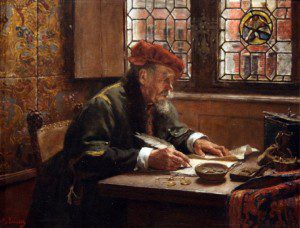 The bigger point here is that free-market economics doesn’t just reduce everything to its cash value. Incentives and costs can be of every kind. In a way, ironically, I find this disturbing, because all of human life can be analyzed in terms of costs and benefits. No action that I take is exempt from this analysis, even if money has nothing to do with it. (Rodney Stark and Roger Finke’s “supply-side theory of religion” is a good example). This could lead to a very reductionistic view of the human person. Of course, the same is true of, for instance, theories that explain human behavior in terms of evolution or of neuroscience. Speakers at Acton frequently make the point that human behavior has many aspects that are non-economic. But I see a certain tension between these disclaimers and the implications of the economic theories espoused at Acton.
The bigger point here is that free-market economics doesn’t just reduce everything to its cash value. Incentives and costs can be of every kind. In a way, ironically, I find this disturbing, because all of human life can be analyzed in terms of costs and benefits. No action that I take is exempt from this analysis, even if money has nothing to do with it. (Rodney Stark and Roger Finke’s “supply-side theory of religion” is a good example). This could lead to a very reductionistic view of the human person. Of course, the same is true of, for instance, theories that explain human behavior in terms of evolution or of neuroscience. Speakers at Acton frequently make the point that human behavior has many aspects that are non-economic. But I see a certain tension between these disclaimers and the implications of the economic theories espoused at Acton.
My other issue with Morse’s talk, and with the economic ideology of Acton generally, was the claim that voluntary transactions are just. Admittedly, this is usually qualified by the caveat that this is true only if there’s no external coercion. But the coercion is usually understood in terms of government intervention, or else of outright fraud. I don’t hear enough recognition of the extent to which an extreme inequality of power compromises the freedom of a transaction. More on that later.
The final lecture of the “foundation” series was on freedom, by Charles Self. Dr. Self pointed out that he was the only Protestant of the four speakers: “After three Catholics, they let a Pentecostal out of the cage.” Like all the foundation speakers, he was a dynamic and entertaining speaker. I have less to say about this talk than the others, both because my brain was quite tired at this point and I took in less and because he was largely summarizing themes I’d heard from the others. He distinguished five kinds of freedom: religious, personal, economic, political, and vocational. In all five areas, like the other speakers, he insisted that freedom must be understood as ordered by the law of God. The main difference from the other speakers, unsurprisingly, was more frequent reference to Scripture and an insistence that Scripture should be the primary authority appealed to. Natural law, while it was mentioned, didn’t show up as prominently as in the Catholic speakers.
Overall, the foundation series provided an excellent introduction to “the Acton perspective.” In fact, it sometimes gave me a framework from which to criticize ideas found in the other lectures. But more on that later!
Edwin Woodruff Tait is a freelance writer, farmer, and consulting editor for Christian History magazine. He blogs at Ithilien and tweets as @Amandil3. (Extra points if you get the Tolkien reference.)
Images: Pixabay and “The Money Changer,” Max Geisser, courtesy of the Grohmann Museum.












